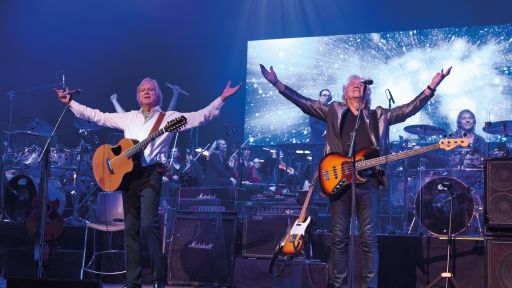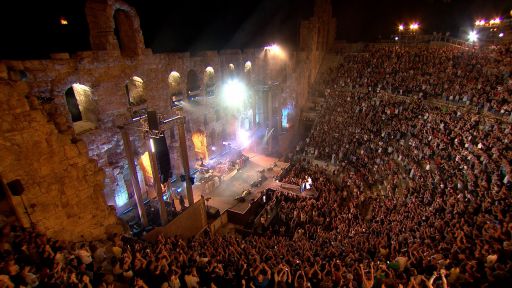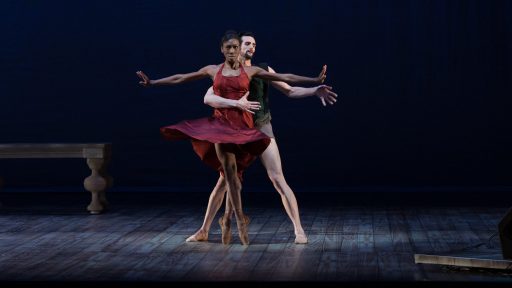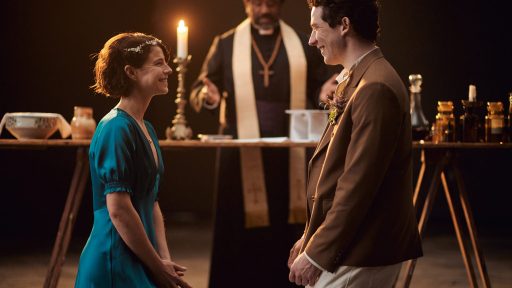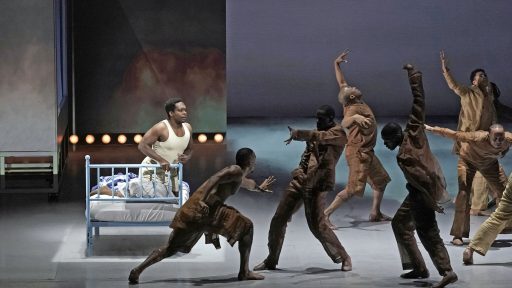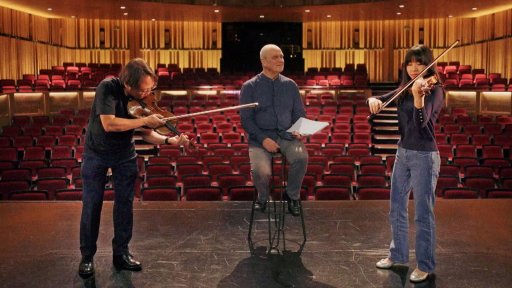Tango to Buenos Aires, Argentina, with host Scott Yoo, flutist Alice Dade, and tango musician and historian Ignacio Varchausky to explore the impact of composer Astor Piazzolla’s work on tango and beyond. With a special look at Piazzolla’s “History of Tango” in four movements (often played on violin, but written for the guitar and flute), Yoo and Dade trace the evolution of the genre from backroom dance halls and working-class neighborhoods of Buenos Aires around the turn of the 20th century to the popular music and dance it is today. Experiencing performances by local artists on the guitar, violin, flute and bandoneon (an Argentine button accordion), Yoo and Dade even receive a tango dance lesson of their own and sample the food and culture of today’s Buenos Aires.
Now Hear This “Piazzolla’s History with Tango”
Tango to Buenos Aires, Argentina, with host Scott Yoo and flutist Alice Dade to explore the evolution of composer Astor Piazzolla’s work and the music genre itself as it becomes fused with jazz across time and numerous instruments.
Features
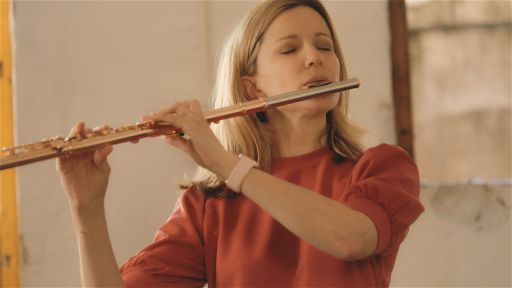
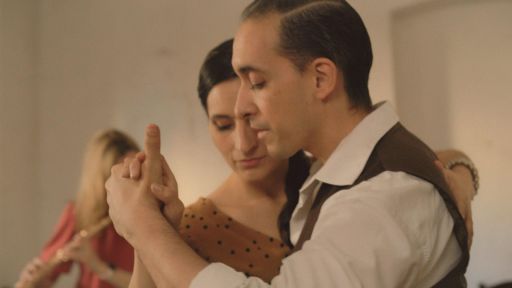
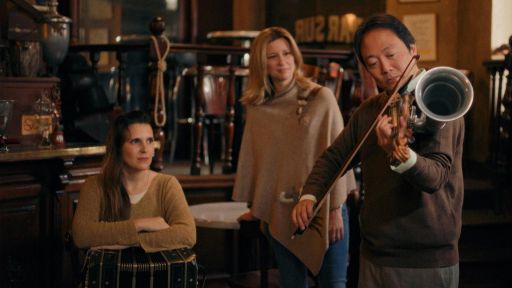
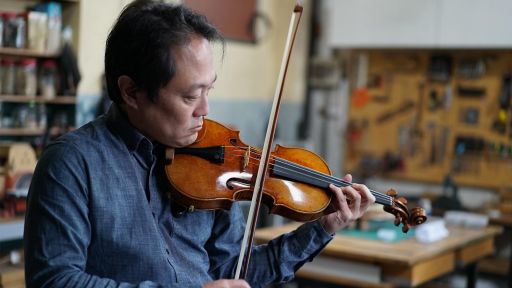
♪♪ [ Accordion playing ] -Coming up on "Great Performances"...
I'm Scott Yoo.
Join me on a trip through the many neighborhoods of Buenos Aires... Looks like Paris.
-Absolutely.
-...to learn the tango.
So this is tango?
-Oh, yes.
[ Tango music playing ] -How to play it... You're using your nail?
-Y también se puede hacer como... -[ Laughs ] -I can't do that.
...and, sort of, how to dance it.
-I apologize in advance.
[ Laughs ] -This is all part of getting to know Astor Piazzolla.
He was an Argentine composer who fell in love with tango.
-So passionate about spreading the lore about this music all around the world with his vision.
-Then fell out of love.
He obviously wanted to do something other than tango.
Then tango fell out of love with him.
-They hated him.
You know, sometimes they even threw gasoline onto the stage.
-We'll find out if they can reconcile, next on "Now Hear This," in "Piazzolla's History with Tango."
♪♪ Major funding for "Great Performances" is provided by... ...and by contributions to your PBS station from viewers like you.
Thank you.
[ Mid-tempo music plays ] -In Buenos Aires, in the famous Estudios ION, a tango quintet exactly in the style of Astor Piazzolla is warming up.
♪♪ I was here to get to know Piazzolla, and to get to know tango.
♪♪ My guide for this journey would be tango musician, radio host, historian, and advocate Ignacio Varchausky.
Few know Piazzolla better.
♪♪ -That's him.
-Yeah, that's him.
The one and only, Astor Piazzolla.
-Look at his face.
-So passionate.
And in all these pictures is Piazzolla recording in this very studio.
And with that legendary engineer -- you know the guy in white?
-Uh-huh.
-That's the great Osvaldo Acedo, who amazingly enough, is here with us.
[ Laughter ] -Hola.
[ Laughter ] -This actually -- This is one of the sessions for "Maria de Buenos Aires."
This is the original record Osvaldo recorded here.
How many records you made with Piazzolla?
-Four.
Cuatro discos.
Y después mucha música de película también.
-This makes this place kind of the Abbey Road of Argentina.
-Yeah, exactly.
-It's cool.
What kind of a person was Piazzolla?
Encantador.
Era -- Mucha gente dice que Piazzolla era muy complicado.
Pero en realidad no era complicado.
-He was always very defensive because all the traditional tango establishment was attacking him... -Right.
-...was accusing him of killing tango, right?
-Oh.
-Yeah, yeah.
That was how intense that fight was.
That's why he's known as a very tough, defensive guy, right?
-So, who are we going to hear today?
-Today we're going to hear Quinteto Revolucionario, which is by far the best Piazzolla music musicians that play in the exact same style as he did with his quintet.
-Y yo armé el estudio igual que como lo armaba para grabar a Piazzolla.
-Yeah, he put all the microphones in the exact same place, exact same fashion, as he put them for Piazzolla himself.
Vamos.
♪♪ ♪♪ -Bueno muchachos, estamos listos para comenzar a grabar una toma.
-Bien.
-Vale.
♪♪ -Tango was born in the working-class neighborhoods of Buenos Aires around the turn of the 20th century.
Astor Piazzolla was born shortly thereafter, and the two grew together.
♪♪ They loved each other.
They hated each other.
They couldn't exist without one another.
I wanted to know their story.
♪♪ Late in life, Piazzolla would write his version, his History of Tango in four movements.
It's often played on violin.
But he wrote it for guitar and flute, which, of course, my wife, Alice, plays.
♪♪ Piazzolla considered these the original instruments of tango.
♪♪ Early tango, first danced in bordellos, bars, and backroom dance halls, before Piazzolla fell for it and changed it forever, would have looked a lot like this.
♪♪ ♪♪ ♪♪ ♪♪ ♪♪ ♪♪ ♪♪ ♪♪ ♪♪ [ Music stops ] Ignacio took us to meet the new Stradivari of the bandoneón, the young luthier Baltazar Estol.
This was the instrument that would soon challenge the guitar and flute to become tango's main squeeze.
This looks like a little piano.
The action for a grand piano in a dollhouse.
-Es muy parecido.
Pero en lugar de funcionar como martillos, como golpeando la cuerda, funcionan como válvulas de aire.
-When you press the button, the air flows into this metal part and generates the sounds.
-Reeds.
-Reeds.
-It's like an oboe.
-It's like an oboe and a piano in a dollhouse.
[ Laughter ] That's crazy.
-The one outside is the reed that sounds when you close the instrument.
-Right.
-The other one... -Is the reverse.
-The other one, when you open it.
-Can you imagine if we had two vocal cords?
[ Laughter ] One for sucking in air, and one for expelling it?
-Yeah, but that's the explanation for how complicated it is.
Because in this instrument, the same button will sound one way -- like, one note -- when you open, but it will sound a complete different note when you push it back.
Only a few notes will be the same both ways.
It is so complicated that it actually has four keyboards.
-Left in, left out, right in, right out.
-You got it.
-Wow.
So this is a really difficult instrument to play.
-Yeah, and to build.
[ Chuckles ] -And to build, yeah.
How did it become the instrument of the tango?
-It has a lot to do with the immigrants that came to Buenos Aires from Europe.
And you know, this is an instrument that was originally designed to play, like, church music.
-Is this like an organ substitute?
-Yes, like a portable organ.
-Oh, that makes sense.
-But it eventually made it into the Buenos Aires brothels, which is, you know, an interesting contrast.
And little by little, it started to become, like, the main instrument of tango, especially since some musicians, like Juan Maglio "Pacho," started to develop its technique.
Eventually, it became, like, the voice of tango, in a way.
-Is that the music you sent me?
The Pacho?
-Yes.
Juan Maglio Pacho.
Juan Maglio Pacho was a very important figure because he was one of the very first professional bandoneón players.
And at some point, he became so popular that people would go to the record shop and instead of asking for a record, they would say, "Give me a Pacho."
And it was one of these.
-Oh, wow.
-Pacho.
-What time period?
-This must be in 1914.
-But Piazzolla, he grew up -- he was born here, but he grew up in New York.
So how did he get exposed to all of this tango music?
Was it through the records?
-Absolutely.
His father -- he had a great record collection of different tango orchestras that he liked.
And I'm sure, at some point, he also heard stuff like this.
Actually, there's no Piazzolla without Pacho.
-I'm really blown away by this, because even for us, as professional musicians, to pick up a bandoneón and try to figure out how to play it... -It'd be a mess.
-And he's figuring out all of this stuff?
-Well, he was a genius.
-I just feel like it's a very unlikely thing for one of the greatest virtuosos of the bandoneón to grow up in New York, because there isn't the culture there.
The culture was just simply a few records.
That's pretty amazing.
-Well, yes, it is crazy.
And it's, I think, it's as random as a bandoneón keyboard.
♪♪ ♪♪ ♪♪ ♪♪ ♪♪ ♪♪ ♪♪ ♪♪ -Bravissimo.
-Ah.
-Bravo.
-[ Chuckles ] This instrument looks so complicated to play.
-Tiene lo suyo.
-[ Chuckles ] Can you show me?
♪♪ ♪♪ I heard that after Piazzolla fell in love with the tango, he started studying Bach.
And he was really crazy about it, and he learned to play the piano.
And I even heard that he started playing the Bach on this instrument.
I mean, is that even possible?
-It's possible.
-It's possible.
-Possible, right.
♪♪ ♪♪ ♪♪ ♪♪ ♪♪ ♪♪ -The Retiro and Recoleta neighborhoods of Buenos Aires look a lot like another famously romantic city.
♪♪ ♪♪ -So, this building was built by a French-roots family in the mid-'20s, and many famous people lived here.
Actually, it's been said that the great Carlos Gardel even lived here for a while.
And you know, Carlos Gardel was the greatest tango singer ever -- ever.
And one of the most inspired tango composers, as well.
He's like a national hero, you know?
And also, he was one of Piazzolla's great inspirations.
They even met.
I don't know if you know this, but they met in New York when Piazzolla was just a child.
He was like 12, 13 years old, and Gardel was filming a movie there.
Eventually, the little Piazzolla got a part in the "El Día Que Me Quieras" movie.
You know, it's like a cosmos miracle.
-Somebody figured out that he was something special even then.
-I think so.
[ Birds chirping ] -This could be in Paris.
-Absolutely.
As you can see, there's a huge French architectural influence here in Buenos Aires.
And if you look around a little, you understand why it's known as the Paris of the south, right?
-Yeah.
-Because, by the late 1800s, we were the sixth economy of the world.
This has been a rich country for a long while now.
Rich but unjust, unfair, unequal.
Right?
So, in different ways, you can link that to the history of tango.
Because in the beginning, tango was a culture that belonged to the low class.
Right?
The upper class didn't accept it, rejected.
But over time, and especially when tango made its way into Europe, especially to France, eventually, it was accepted here.
-So, tango was the music of the poor, and it needed the validation of the French in order for it to be legitimate here in Argentina.
-Exactly.
♪♪ ♪♪ -When Piazzolla moved from New York, back to Buenos Aires, in the 1930s, he arrived to find a Paris-style café society, where tango was becoming more sophisticated.
♪♪ ♪♪ ♪♪ ♪♪ ♪♪ ♪♪ ♪♪ ♪♪ ♪♪ ♪♪ ♪♪ [ Traffic passing ] [ Door opens ] San Telmo, one of the oldest neighborhoods in Buenos Aires, was a hotbed of tango in the 1930s, and it still is.
Some things haven't changed much in 90 years.
-Here we are.
The famous Bar Sur.
-Cool.
Let's go in.
-Do you think Piazzolla played here?
-Well, I'm not sure about that, but we know that he played in these kind of cafés in the late '30s.
-It looks like we are in 1930 right now.
-Yeah, they kept it the way it was.
And when you are here, you can feel the atmosphere of that time.
And the music that was in the air, you know, the likes of Julio de Caro, and Elvino Vardaro -- those musicians that heavily influenced him.
Both violin players, by the way.
-So that's why he incorporated violin into his music?
-Well, let's say that by the '30s, the tango had developed from that original trio, quartet, with guitar, into a different form.
-This reminds me of a symphony orchestra in some ways.
You have the bottom, which you play.
We have the top, we have the winds.
And then the piano is kind of the Everyman, just kind of covering everything else.
I mean, this small group is like a jackknife.
It covers everything.
It's incredible.
-You are totally right on that.
This formation -- two bandoneóns, two violins, piano, and bass -- is like the beginning of the real orquesta típica.
-Mm-hmm.
-And if you think about it, it's the backbone of modern tango.
-What are we going to be playing today?
-Today we're going to play "Tierra Querida," a wonderful tango by Julio de Caro.
Anyone that loves tango loves this piece.
And it's an important piece because Piazzolla recorded it with his first orchestra.
It's a piece that you need to know if you want to know tango.
-Nice.
Well, I don't know tango, because even though I can play the violin, I don't know how to do it like he can do it.
So he needs to teach me.
-Yeah, well, he knows everything.
So you can show him your secrets.
[ Laughter ] -Bueno, acá también tenemos los portamentos, ¿sí?
Vamos a ver este pasaje, por ejemplo.
♪♪ -Eso.
Y también tenemos dentro de la parte rítmica tenemos algunos efectos que hacemos los violinistas.
De Caro hacía mucho de eso.
Uno es el tambor.
♪♪ -How are you doing that?
-Que hay que poner la uña, apoyarla en la cuerda sol.
-Okay, you're using your nail?
-Yeah.
-Puedes hacer un pizzicato.
-Think about it.
Tango is danceable music, but without a drum set.
-Aha, so this is both the melodic instrument and the percussive instrument all in one.
-Exactly, exactly.
-Hmm.
-Golpeando la uña.
Eso.
Perfecto.
-[ Chuckles ] -It's hard to do.
-Sí, y también -- Bueno, se puede hacer como... [ Strings play "drum" ] -Redoble.
[ Laughter ] -I can't do that.
Forget it.
-Y también tenemos la chicharra, que se toca en la cuerda Re en el hilo.
-Okay.
Acá atrás del puente.
[ Strings play "cicada" ] -Huh.
[ Strings play "cicada" ] Oh.
-Yes.
-Oh, wow.
Where you put the bow...
When I've played Piazzolla before, I've always tried to make that noise.
But I've done it here [Strings play "cicada"] and it always sounded like somebody mopping the floor.
I didn't realize it was on the D string, and I didn't realize that it matters where you place your bow.
So, can you do yours again?
Una vez más, por favor.
-Sí.
[ Strings play "cicada" ] ♪♪ -I see.
Okay.
-Everything you're discussing -- the staccato, the portamento -- you can find all that in Julio de Caro's music.
But you can find all that in Piazzolla's music, as well.
-Who developed these extended techniques for the violin?
Was it Julio de Caro?
Who made it?
-Part of it is De Caro's.
And part of it comes from before.
-Because this is really very inventive to use the violin in that way.
This is not how you're supposed to use the violin.
-No, no, no.
-But it sounds good.
-Yeah, yeah, yeah.
We love to do what's wrong with our instruments... -Great.
-...like go against the academia sometimes to make it our own.
I mean, you have to play well, right?
But then we have our tricks.
-And break the rules a little bit.
Selectively, break the rules.
-Yeah.
And also, remember that this music was originally created by intuitive musicians.
-That's great.
Let's play this piece.
-Absolutely, we can play this piece.
But before, we have to show you something because it's a little surprise.
-Okay.
-Because Julio de Caro was so famous that the RCA Victor label gave him a special gift -- a special violin that he used for all his famous recordings, which is the violin corneta.
-Wow.
This is bizarre.
-[ Chuckles ] -I'm going to swap you.
-Have you ever seen one?
-I've never seen this before.
-Should I try a little bit?
-Please.
♪♪ -I mean, it's so strange because I feel like I'm playing a brass instrument.
It's so strange.
It's like child's fairy tale.
[ Laughter ] Half zebra, half alligator, or something.
That's what this is.
-Absolutely, absolutely.
It's like the love child of a trumpet and a violin.
[ Laughter ] -Alright, I'm going to put this down, and let's play some music.
-Yeah, let's do it.
♪♪ ♪♪ ♪♪ ♪♪ ♪♪ ♪♪ ♪♪ ♪♪ ♪♪ ♪♪ ♪♪ ♪♪ -As night falls, Argentines come out to dance, a tradition alive from the 1940s, when tango reached the height of its popularity.
You can still find dance halls across the city's many barrios.
♪♪ -So, here we are.
Welcome to Salon Canning, the true house of tradition.
You know, here, every night, the best tango dancers gather together to dance tango.
The room is so beautiful, you'll see.
They also have one of the best floors for tango dancing.
Not only are we going to enjoy the night here, watching people dancing, but we have a surprise for you guys.
You're going to have a tango lesson with one of the most amazing tango choreographers in the city -- Melina Brufman.
Let's go.
♪♪ ♪♪ ♪♪ ♪♪ -Wow.
-[ Laughing ] Oh!
[ Applause ] -Hey.
Welcome.
-Wow.
-Welcome.
-Thank you very much.
-You're the world's best.
-Thank you very much.
-Thank you very much.
-So, this is tango.
-Oh, yes, this is tango.
This is a perfect expression of the tango in the '40s, the golden age of tango.
Right?
Because now you have a bigger orchestra than in the '20s and in the '30s.
And this is a great orchestra à la Pichuco, re-creating the style of the great Aníbal Troilo.
It's an important orchestra because in that orchestra, a young Astor Piazzolla played the bandoneón.
But over time, he became one of the main arrangers of this orchestra.
-Oh.
-Actually, let me show you a little picture -- an original picture from 1941.
What you can see -- -Who's Troilo?
-This is Troilo playing the bandoneón -- first bandoneón -- and this is the young Astor Piazzolla... -Oh!
-...playing beside him.
-So, this man Troilo was like a mentor for Piazzolla, support him?
-Absolutely.
Not only he was a mentor, but he was asking him to push the limits of what was possible in tango music writing, right?
-So, these bandoneón players right here are the musical descendants of Troilo and Piazzolla?
-I think every single bandoneón player is a Troilo descendant, right?
-[ Chuckles ] -Yes, because he created a new way of playing.
Not only combining the virtuoso part of it, but playing from the heart to the heart.
-How does it feel to dance with a live orchestra, versus a recording?
Does it feel different to you?
-Very different.
-Do you feel them?
-Very, very different.
-Very different.
Much better with them.
-Also, you got to understand that by the '40s, there were so many tango orchestras, because tango was so commercially successful, that the different orchestral styles started to develop.
At the same time, the different dancing style started to develop in the different neighborhoods.
-Right?
-Yeah, yeah.
So you have center style, you have Villa Urquiza style.
People will dance, embrace differently.
-But this is all in Buenos Aires?
-In Buenos Aires.
But different neighborhoods develop different ways to dance the same tango, but very, very different when you see it.
Because also, at the same time, every dancer needs to develop their own identity.
So you will find out right now, because we are going to teach you a basic step.
-Okay.
-So you're going to try now.
You want?
-This is like Stephen Hawking teaching arithmetic or something.
It's ridiculous.
-Let's see what Missouri style is like.
-Yeah, yeah, you'll see, everybody can dance.
-I think you can do it.
-We'll give it a try.
-I'll enjoy it from there.
-Okay.
-We'll show you first, and then it's your turn, okay?
-Okay, sure.
-Ooh.
-We have eight steps.
One, two, three, four, five, stepping.
-I'm already lost.
-Six, seven, and eight.
-Okay.
Can you do that again?
-Let's do this, let's do this.
Scott, behind me.
-Alice, behind me.
-Okay.
-This would be very helpful.
-Leandro, Alice, beside me.
Let's copy.
-Okay.
And one, two, three, four... -Oh.
-Five.
-It's time for the lady to cross.
-Okay.
-We change the weight now.
-Okay.
-Left for the guy.
Six, seven, and finish it.
That's it.
-Okay.
-That's very good.
We're going to try with the music.
-Okay.
-But for managing the room, you're going to dance with me, if you please.
And Alice is going to dance with Leandro.
-Is that okay?
-That's great.
-I apologize in advance.
[ Laughs ] -Where do we start?
-You're doing great.
-So, we start from here.
-Okay.
♪♪ ♪♪ [ Indistinct conversation ] ♪♪ ♪♪ -Oh!
-You did great.
-[ Chuckles ] That was so much fun!
-[ Laughs ] -Okay, you know what?
I would like to see the masters.
-Okay.
-Would you mind doing one?
Of course, yes.
-Melina?
-Claro que sí.
♪♪ ♪♪ ♪♪ ♪♪ ♪♪ ♪♪ ♪♪ -Carlos Rossi, a revered master of the tango, joined us to sing one of Troilo's most beloved tunes.
-♪ Paredón, tinta roja en el gris del ayer ♪ ♪ Tu emoción de ladrillo feliz ♪ ♪ Sobre mi callejón, con un borrón ♪ ♪ Pintó la esquina ♪ ♪ Y al botón, que en el ancho de la noche ♪ ♪ Puso al filo de la ronda, como un broche ♪ ♪ Y aquel buzón carmín ♪ ♪ Y aquel fondín donde lloraba el tano ♪ ♪ Su rubio amor lejano, que mojaba con bon vin ♪ ♪ ¿Dónde estará mi arrabal?
♪ ♪ ¿Quién se robó mi niñez?
♪ ♪ ¿En qué rincón, luna mía ♪ ♪ Volcás como entonces tu clara alegría?
♪ ♪ Veredas que yo pisé, malevos que ya no son ♪ ♪ Bajo tu cielo de raso ♪ ♪ Trasnocha un pedazo de mi corazón ♪ [ Instrumental music plays ] ♪♪ ♪♪ ♪♪ ♪ Veredas que yo pisé, malevos que ya no son ♪ ♪ Bajo tu cielo de raso ♪ ♪ Trasnocha un pedazo de mi corazón ♪ [ Music stops ] -Downtown, at the Emilio Balcarce Tango Orchestra School, another old master, Victor Lavallén, teaches golden-age standards to a new generation.
-¿Entendió?
Vamos a hacerlo los bandoneones solos.
Después hacemos todos, ¿eh?
Vamos.
Uno, dos, tres.
♪♪ -Ignacio, of course, is also the artistic director here.
♪♪ -Perfecto.
Así es.
-How many tango schools are like this in the world?
-Well, not many.
Not many.
But I can tell you, when we started 22 years ago, it was pretty much the only one.
-Zero.
-Yes, but other schools started to blossom around the world.
-You have children now.
-Yes, yes.
Over the years, we have like over 300 graduates.
And many of those are from different countries around the world, so they get back to their countries and teach what they learn here.
-So there are a lot of young people who like tango... -Oh, yeah.
-...and are interested in making tango part of their artistic life.
I think that's so heartening.
-Absolutely.
And it takes a great commitment, not only to study to be good enough to enter the school, but also to stay here working with us for two full years.
But they understand, this is the house of tradition.
And as Gustav Mahler said, tradition is not to worship the ashes, but to pass the torch.
So, we don't only have Victor here, we also have the great new masters of tango, like the great Guillermo Rubino on the violin.
Why don't you join him with your violin?
-Oh, that'd be great.
-Come on.
-Okay, I don't want to ruin this piece of music that you're about to play, so tell me what I need to know.
-The important thing that you have to know is how to use the bow in the rhythmic melodies, and how to play short.
It is not the normal way, the classical way, like... ♪♪ -That's how I'd do it.
-It's okay in classical music.
But here in tango, it's... ♪♪ Let's play together here.
Can you play?
-That sounds as short as cutting a toenail or something.
It's so quick.
-It has to be very percussive.
-I don't know if I can do this.
-Yeah, yeah, try.
Yes, you know -- -How do you get it so short?
-It has to be in the frog, but here.
It's very similar to pizzicato.
But with the bow.
-Wow.
-And the secret is to use our wrist and finger very free.
♪♪ Yes.
Don't move your arm, just the wrist.
And out, out, out.
Ah.
-I feel like a beginner.
-[ Chuckling ] No.
-But I do.
-Okay, at the beginning, it will be like that.
It's practice.
-Is this the hardest thing for a classically trained violinist to get for tango?
It's this, right?
-Totally.
-This is the hardest.
Yes, yes, because it's totally different.
-Well, I'm not going to master this, of course, but can we play and can the maestro conduct, and can we play everybody together?
-Yes, of course.
-Let's try that.
-¿Victor?
¿Podemos contar?
Sí, sí.
-Un, dos, tres.
♪♪ ♪♪ ♪♪ ♪♪ ♪♪ ♪♪ ♪♪ ♪♪ -Uno.
♪♪ ♪♪ ♪♪ -As golden-age tango got comfortable, Piazzolla grew restless.
He started including rhythms and chord progressions from classical, jazz, and Brazilian music in his arrangements.
♪♪ ♪♪ ♪♪ In the midcentury-modern San Martín theater, Juan Roque Alsina and his quartet would tell me about the beginnings of the rift between Piazzolla and tango.
♪♪ ♪♪ ♪♪ ♪♪ ♪♪ ♪♪ ♪♪ Whew!
Boy, my hands are going to bleed.
[ Laughter ] So that's Ginastera.
He's great, but he's hard.
-It is.
-Difficult, difficult.
What's the connection between Ginastera and Piazzolla?
-It seems that Piazzolla went to Arthur Rubinstein concert... -One of the greatest pianists ever.
-Right.
To show him his newly written piano concerto.
So, Rubinstein tells him, "You really like composing?"
"Yes, I do."
"So, what you should do, you should study."
-Mm-hmm.
-"I can recommend you to Alberto Ginastera."
-He obviously wanted to do something other than tango.
He's already trying to go into the classical direction.
-By the time, he was the leading tango arranger.
So, yeah, there was something in the back of his mind telling him, "We have to move maybe to another direction, or try to go that way."
-Obviously, he really did learn something from Ginastera.
-Well, Piazzolla later in life, he said, "My three teachers in life were tango, Buenos Aires, and Ginastera."
-In the beautiful Palermo neighborhood, Alice and I were invited to one of the city's best parrillas for the food that Argentina does better than anywhere else.
[ Indistinct conversations ] Our host was Argentine trumpeter Eugenio Elias.
-I've heard that people in Argentina eat more beef than anyone in the world.
-Yes, we do.
Actually, when I get together with my friends, we have asado, and we have, like, meat with meat.
[ Laughter ] That's it.
-Meat with meat.
-Yeah.
-What makes this restaurant the best in Argentina?
-I think the produce.
Like, all the work we do with the cattling, the meat.
We also do a process of dry aging and wet aging.
Two different processes.
And the care, we don't waste anything.
-Wow.
-Let's go eat some.
-Okay.
-Thank you.
-Thank you, chef.
-Bye.
[ Indistinct conversations ] -Thank you.
-You're welcome.
-Look at that.
Oh, my God.
[ Laughter ] -That is unbelievable.
It makes you remember that a tomato is a plant.
-[ Laughs ] -Oh, man.
-No.
No.
-No?
Oh, no.
No, no.
-That... -It's the best I've ever had.
It almost tastes like foie gras or something.
-Mm-hmm.
-Amazing.
-There's so much in it.
-Mm-hmm.
So rich, right?
-It's incredible.
-Mm-hmm.
-Incredible.
As good as it was, we weren't here to talk about the food.
-Mmm.
-Eugenio, a devoted tango enthusiast, had a story to tell.
-So, Piazzolla is in big turmoil.
Dancers could not dance to his music very well.
-Why?
-Because he was adding different types of rhythms.
The rhythm wasn't the same all the time.
-Wasn't traditional anymore.
-Right.
And they hated him.
Sometimes they even threw gasoline onto the stage.
Imagine what could have happened.
-Yeah, that's dangerous.
-That's serious.
-Incredible.
And so he just basically falls out of love with tango and says, "I'm going to go into classical music.
And he gets a scholarship to go to study with the famous teacher Nadia Boulanger in Paris.
So, he gets there, and after a few months, she asks, "Piazzolla, don't you play that instrument in Argentine music, the bandoneón?"
-Oh.
-And he doesn't want to admit it, but he says, yes.
-Why?
Because he's embarrassed.
-He's embarrassed, exactly.
He doesn't want to show her that he's a tango player, a popular music player.
-Well, and he hasn't gotten over the rejection that he experienced.
-Of course.
And so he actually -- the next lesson, he brings the bandoneón, and she asks him to play for her.
And she can't believe what she hears, and looks at him in the eye and says, "Piazzolla, this is the real you.
Don't ever leave it."
So he goes back to his first love in a way that he never imagined he would.
Piazzolla integrates classical and tango.
And when he comes back, he adds electric guitar, which he had heard from jazz groups at the time.
And instead of sitting down like bandoneón players do in typical tango orchestras, he hated sitting down because it reminded him of grandmas knitting sweaters or something.
He actually says that.
-[ Laughs ] -So he stands up.
And all the possibilities of stretching the bandoneón almost to the floor, lifting it up, and conducting the quintet.
And he's up front.
He's wiping out everything that came before him, and changes the course of the music forever.
♪♪ ♪♪ ♪♪ ♪♪ -This is five people, but it sounds like one instrument.
I mean, they can read each other's minds.
-I know, right?
It is so arranged, so well organized, but it sounds completely free.
-Right.
-And Lautaro -- you can hear him, right?
This is the closest you'll hear to Piazzolla's playing.
He's so dedicated to his style.
He's been playing this since he was born.
Actually, he was born the same day as Piazzolla.
-What?!
That's crazy.
-[ Laughs ] -Like fate, right?
-His parents planned it that way.
-[ Laughs ] -Fate.
Amazing.
♪♪ ♪♪ ♪♪ ♪♪ ♪♪ ♪♪ ♪♪ -Piazzolla had come back to tango, and eventually tango came back to him, as audiences, musicians, and new composers, like Diego Schissi, recognized Piazzolla's ideas were keeping tango fresh and relevant.
♪♪ ♪♪ ♪♪ ♪♪ ♪♪ Wow!
-[ Chuckles ] Diego, this is awesome music.
I'm ready to become a roadie for you guys.
[ Laughs ] -Thank you very much.
-I mean, you have such imagination.
And it's tango, but it's -- you're stretching it as far as it will go.
It's fantastic.
-For us, it is -- we think it -- we relate to a tradition.
We are very much in love with the roots of tango.
I think it has something to do with the understanding tango as a living force that ever changes, so... -Well, Piazzolla lives on through you.
-Through us, yes.
-Through you all.
-Yes.
♪♪ ♪♪ -In the spirit of modernization, I chose one of Piazzolla's famous quintet numbers, and Ignacio commissioned a brand-new arrangement for violin and full tango orchestra.
It would give me a chance to try out my new techniques.
♪♪ ♪♪ ♪♪ Tango dance has progressed, too, incorporating ideas and movement from modern dance.
♪♪ ♪♪ ♪♪ ♪♪ ♪♪ ♪♪ ♪♪ ♪♪ ♪♪ In the end, largely thanks to Piazzolla, tango lives on, long after he's gone -- a vibrant, ever-evolving art form.
♪♪ And if you ever make it to Buenos Aires, you can now hear this.
♪♪ ♪♪ -To order "Now Hear This" on DVD, visit ShopPBS or call 1-800-PLAY-PBS.
This program is also available on Amazon Prime Video.
♪♪ To find out more, visit pbs.org/greatperformances.
Find us on Facebook and follow us on Twitter.
♪♪ ♪♪ ♪♪
You May Also Like
